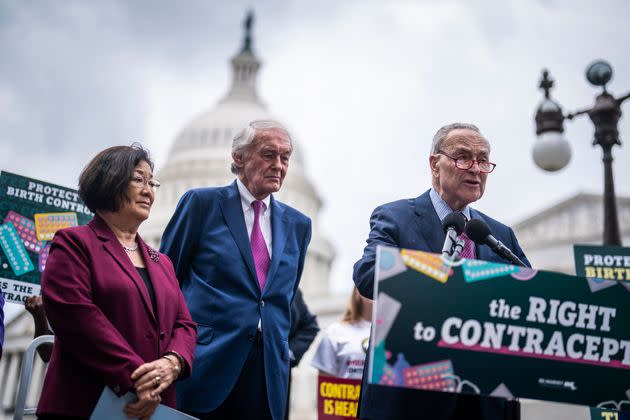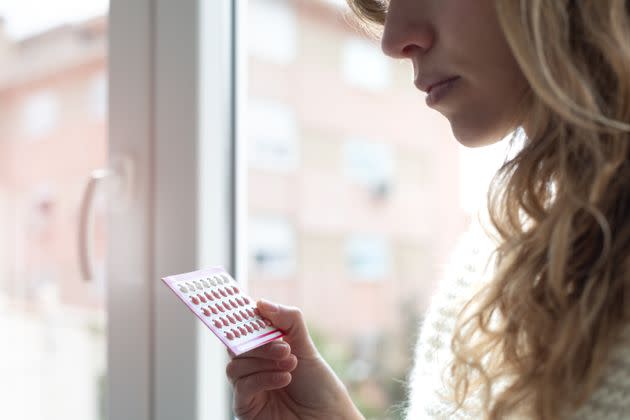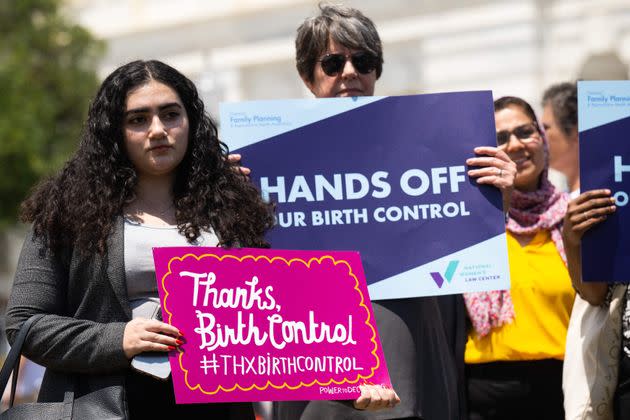Women Don't Just Take Birth Control To Prevent Pregnancies

An estimated 6.5 million people in the United States have endometriosis, a painful condition in which the uterine lining spreads and grows outside of the uterus.
The first step for treatment of painful periods associated with the disease, according to gynecologists? Hormonal birth control.
That’s what Bella, a 21-year-old New Yorker, has taken since age 13 to treat the often-debilitating symptoms of endometriosis: painful, heavy periods; gastrointestinal issues; and intense fatigue.
“I know that sounds very young to be on birth control, but I have been experiencing these symptoms since my first menstrual cycle at age 12,” said Bella, who, like others in this story, asked to be identified only by her first name to protect her medical privacy.
“Birth control changed my life,” she told HuffPost. “Before the pill, my period was so heavy and so painful I was missing school, sports, extracurriculars ― even just hanging out with friends was impossible.”
“I would never be able to live independently, attend college, work a job or have meaningful relationships without it,” she said. “It alleviates my symptoms and makes it possible for me to function.”
Reproductive health care encompasses so much more than just preventing pregnancy.Dr. Allison K. Rodgers, an OB-GYN
Given how indebted she feels to the pill, she was disheartened earlier this week when Senate Republicans blocked the Right to Contraception Act, legislation that would enshrine a federal right to access contraception.
“I may take it mostly for my endometriosis, but women are also 100% justified in taking it to prevent pregnancy,” she said. “It shouldn’t matter why someone is taking it, and it’s no politician’s business.”
“If right-wing politicians are sick of abortions, it’d be stupid to ban access to birth control or the morning-after pill, like Plan B,” Bella said. “They’re so hypocritical.”
Democrats brought the bill to the floor out of fear that reproductive rights will be further threatened after the U.S. Supreme Court overturned the national right to an abortion two years ago. Just last month, former President Donald Trump said that he’d be “looking at” restricting contraception access should he win back the presidency in November, though he later backtracked.
On Wednesday, the vote on the Right to Contraception Act was 51-39, falling short of the 60 votes needed to defeat a filibuster and move the bill forward.
Republicans argued that access to contraception is already protected by the U.S. Supreme Court ― but Democrats scoffed at the idea, noting that access to abortion was protected by the high court, too, before Roe v. Wade was overturned in June 2022. Prior to that, plenty of Republicans lawmakers gave the same assurances about abortion rights, Sen. Elizabeth Warren (D-Mass.) argued. And within that 2022 ruling, Justice Clarence Thomas argued that the court should reconsider several other rights, with access to contraception among them.

What’s often missing from the conversation on contraceptives is how many people like Bella take hormonal birth control for non-contraceptive reasons. Countless women and gender-fluid, nonbinary and transgender people want contraceptive care to be codified, too, just like those who depend on it primarily to prevent pregnancy.
A 2011 study from the Guttmacher Institute found that 14% of women who used a hormonal birth control pill ― or 1.5 million women ― took the medication exclusively for non-contraceptive reasons. And 58% of birth control pill users took the pill “at least in part” for purposes other than contraception.
Among teens, that percentage was higher: About one-third of respondents (33%) ages 15 to 19 who took a birth control pill did so for reasons other than preventing pregnancy, according to the study.
That was the case for Katie Ann, a 36-year-old from North Carolina, who started taking the pill at 16.
“When I’m off the pill, I get debilitating cramps,” she told HuffPost. “I passed out in a Macy’s when I was 16, and that’s when my mom decided to take me to the doctor.”
Once, Katie Ann went off birth control for a year and a half. In that time, she had to take eight sick days at work.
“I’d wake up at 4 a.m. doubled over in pain and by 6 a.m. could still barely get off the floor,” she said. “When I say birth control changed my life, I truly mean it.”
Dr. Allison K. Rodgers, an OB-GYN and reproductive endocrinology and infertility specialist at Fertility Centers of Illinois, said it’s often difficult periods like that which bring people to her office to discuss taking birth control.
As mentioned before, for the symptoms of fibroids and endometriosis, hormonal birth control is the go-to treatment since there can be significant risk to surgical options, Rodgers said.

“Heavy periods can also cause anemia, and the treatment is hormones to lighten the cycles to prevent anemia,” she said.
That’s what happened to Elise, a 33-year-old from Texas who started taking birth control at 16, long before she was ready for sex, she said.
“I knew I had a problem when one day I passed out while going for a walk in a public park,” Elise said. “Bystanders assumed I was on drugs and ignored me. It was totally unsafe.”
“I was scared to go on birth control because, as a woman of faith, I had heard awful things about women that use contraception, but my period symptom left me lightheaded all the time.”
Ultimately, being able to use birth control as a hormonal therapy meant reducing the amount of pain Elise experienced and reducing the amount of blood she was losing every month.
“Birth control dramatically improved my health, safety and quality of life. It fixed my anemia, so now I have more energy,” she said. “I’m married now and might start a family some day, but for now I’ve been prescribed two types of hormonal birth control.”
Elise said she knows a lot of people ― men and women alike ― who have no idea that hormonal birth control is used in such a way: “It’s isolating and scary when others shame birth control users just because they don’t know what the medication can really do for women’s health.”

Years ago, Cheryl, a 54-year-old from New Jersey, was put on birth control after being diagnosed with bilateral endometrial ovarian cysts. She stayed on it for eight years.
“I had two treatment options: Have surgery, which would have been invasive, expensive, terrifying, and would have kept me out of work for two weeks, or pop a pill every morning,” she said.
“I didn’t want to risk the cysts growing larger or worse, having an ovary torsion, so birth control was a no-brainer,” she added.
Rodgers, the OB-GYN, said birth control is also prescribed to people with polycystic ovary syndrome, who are at risk of developing uterine cancer if not treated with hormones.
“Birth control actually reduces risks of ovarian cancer, and for many patients who are at high risk, this can be a very important long-term treatment,” she said.
People undergoing fertility treatment are prescribed birth control, too, Rodgers said. It’s used to control cycles before in vitro fertilization or frozen embryo transfer cycles and to keep the uterine lining thin in preparation for a hysteroscopy, an exam of the inside of the cervix and uterus.
“Reproductive health care encompasses so much more than just preventing pregnancy,” Rodgers said.

For intense period pain, one alternative is an anti-inflammatory medication, such as ibuprofen, that can be purchased over-the-counter but isn’t generally as effective as hormonal birth control, said Dr. Karen Tang, a gynecologist and the author of “It’s Not Hysteria: Everything You Need to Know About Your Reproductive Health (But Were Never Told).”
If someone is experiencing severe pain that is not controlled by birth control, Tang suggests discussing further evaluation and different treatment options with their doctor.
Tang said she’s unnerved when lawmakers weigh in on contraceptive and abortion care.
“I always say, imagine if lawmakers were deciding on someone’s right to access chemotherapy, diabetes or blood pressure medication, surgery for hip replacement,” she said.
“Or imagine if senators who were Jehovah’s Witnesses could impose their beliefs about blood transfusions on all Americans and say that they were illegal and subject to criminal penalties if a doctor were to give someone a blood transfusion,” Tang said.
That’s how many doctors and other medical professionals see arguments about abortion, birth control and gender-affirming care, Tang said.
“It’s debate by politicians who have no medical expertise making essentially medical decisions on behalf of people without understanding the ramifications,” she said.

